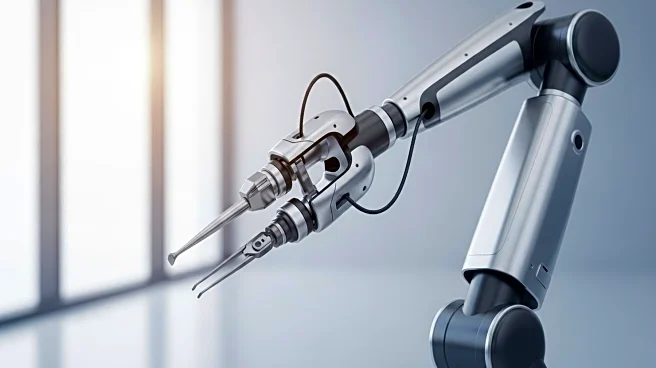What's Happening?
Distalmotion has announced that its Dexter robot has received the Food and Drug Administration's 510(k) clearance for performing hysterectomy procedures. This marks the third U.S. authorization for the Switzerland-based company, following previous clearances for gallbladder removal and inguinal hernia repair. The latest clearance includes enhancements to improve operating room setup and procedural workflow, covering ovary and fallopian tube removal, among other gynecologic procedures. Distalmotion is targeting hospital outpatient and ambulatory surgery centers with its mobile robot, which has been used in over 2,000 procedures across various surgical fields. Concurrently, AiM Medical Robotics has closed an $8.1 million Series A financing round to support its neurosurgery platform, which integrates intraoperative MRI and robotic guidance for procedures such as neurostimulation lead placement for Parkinson's disease. The funding round was led by IQ Capital and 1540 Ventures, with participation from several other investors.
Why It's Important?
The FDA clearance for Distalmotion's Dexter robot signifies a significant advancement in robotic-assisted surgeries, particularly in high-volume gynecologic procedures like hysterectomies. This development could enhance surgical precision and efficiency, potentially reducing the burden on healthcare facilities by enabling more procedures to be performed in outpatient settings. For AiM Medical Robotics, the successful funding round underscores the growing interest and investment in robotic technologies that integrate advanced imaging techniques, which could revolutionize neurosurgical procedures by improving accuracy and patient outcomes. These advancements reflect a broader trend towards the adoption of robotic systems in medical procedures, which could lead to improved healthcare delivery and patient care.
What's Next?
Distalmotion plans to continue expanding its robotic surgery capabilities, with ongoing studies into the use of its Dexter robot for additional procedures such as ventral hernia repair and uterine fibroid removal. AiM Medical Robotics is preparing for first-in-human trials of its neurosurgery platform, which could pave the way for broader clinical adoption. The success of these trials and subsequent regulatory approvals will be crucial for the company's growth and the wider acceptance of robotic-assisted neurosurgery. Both companies are likely to face competition from established players in the robotic surgery market, necessitating continued innovation and strategic partnerships.









